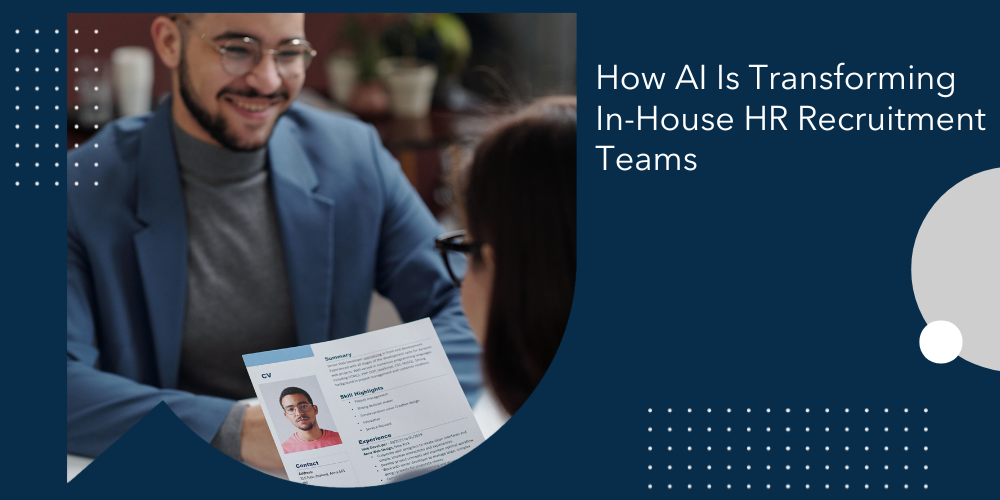
How AI Is Transforming In-House HR Recruitment Teams
Recruitment has always been about people—but increasingly, it's also about technology. In particular, Artificial Intelligence (AI) is reshaping how in-house HR teams attract, assess, and hire talent. While the human element of recruitment remains critical, AI is streamlining operations, improving decision-making, and helping recruiters focus on what matters most: building meaningful relationships with candidates.
Here’s how AI is changing the way in-house HR teams operate—and what this means for the future of recruitment.
1. Faster, Smarter Sourcing
Gone are the days of manually trawling through resumes or LinkedIn profiles. AI-powered sourcing tools can now scan thousands of online profiles, job boards, and databases in seconds to surface top candidates based on skills, experience, and even cultural fit.
These tools:
Rank candidates based on job relevance.
Proactively identify passive candidates.
Learn from hiring trends to continuously improve recommendations.
This allows HR teams to dramatically reduce time-to-fill while accessing a broader, more diverse talent pool.
HireEZ (formerly Hiretual) – AI-powered outbound sourcing tool that finds and engages passive talent.
SeekOut – Deep talent search platform with diversity filters and talent insights.
2. Automated Screening—Without Losing the Human Touch
Screening candidates can take hours, especially for high-volume roles. AI tools can automate this process using natural language processing (NLP) to scan resumes, cover letters, and application forms for relevant experience and keywords.
Some platforms go a step further by:
Conducting AI-driven video interviews, assessing tone, language, and facial expressions.
Offering chatbot pre-screens, allowing candidates to answer initial questions any time of day.
For HR teams, this means they can shift their time from sifting CVs to engaging qualified candidates faster.
HireVue – AI-enhanced video interviewing and assessment platform.
XOR – Chatbot that screens candidates, answers FAQs, and schedules interviews automatically.
3. Reducing Unconscious Bias in Hiring
One of AI’s most promising benefits in recruitment is its potential to reduce bias. When designed thoughtfully, AI can help level the playing field by:
Anonymising resumes during the screening process.
Standardising interview questions and scoring methods.
Focusing on skills and data over demographic cues.
However, it’s crucial to monitor these systems closely to avoid inheriting bias from historical data. A diverse HR team overseeing the AI process ensures that fairness remains a top priority.
Textio – Augmented writing platform that detects and removes biased language in job ads.
Applied – Anonymous application platform using skills-based, structured hiring to reduce bias.
4. Predictive Hiring: Anticipating Needs Before They Arise
AI doesn't just improve current hiring—it helps predict future needs. Workforce planning tools powered by AI can:
Analyse turnover trends.
Highlight talent gaps across departments.
Recommend when and where to hire before a problem arises.
This transforms HR teams from reactive to strategic, allowing recruitment to become a key driver of business growth.
Textio – Augmented writing platform that detects and removes biased language in job ads.
Applied – Anonymous application platform using skills-based, structured hiring to reduce bias.
5. Enhancing the Candidate Experience
AI is also reshaping the candidate journey. Chatbots and automated communication tools can:
Answer FAQs 24/7.
Provide real-time updates on application status.
Schedule interviews without back-and-forth emails.
This ensures candidates feel informed and respected—regardless of whether they land the role.
Paradox (Olivia) – Conversational AI that automates engagement, scheduling, and screening.
Phenom – Talent experience platform that personalises the candidate journey using AI.
6. The Evolving Role of Internal Recruiters
With AI taking care of many administrative tasks, the role of the recruiter is becoming more strategic and people-focused:
Building relationships with hiring managers.
Shaping employer brand and EVP.
Engaging passive talent.
Coaching hiring teams on inclusive practices.
Rather than replacing recruiters, AI is giving them time and tools to be more impactful.
Paradox (Olivia) – Conversational AI that automates engagement, scheduling, and screening.
Phenom – Talent experience platform that personalises the candidate journey using AI.
What This Means for HR Teams Now
In-house HR and recruitment teams must adapt by:
Embracing digital literacy and understanding how AI tools work.
Staying updated on ethical AI practices and compliance regulations.
Collaborating with IT, data, and DEI teams to implement tools responsibly.
Upskilling in areas like data analysis, behavioural science, and strategic workforce planning.
Final Thought: The Future Is Human + AI
AI is not the end of recruitment as we know it—it’s the evolution of it. The most successful HR teams will be those that blend the efficiency of AI with the empathy of human recruiters. By automating the repetitive and enhancing the intuitive, AI is paving the way for more thoughtful, data-driven, and candidate-centric hiring.
